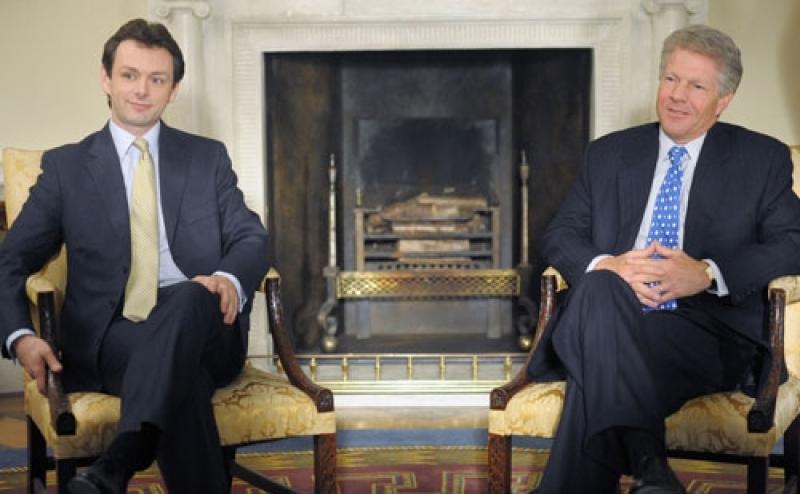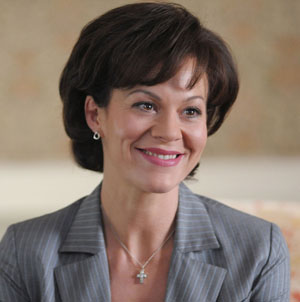The Special Relationship, BBC Two | reviews, news & interviews
The Special Relationship, BBC Two
The Special Relationship, BBC Two
Does Michael Sheen's third shot at Tony Blair overstay its welcome?

The double act between screenwriter Peter Morgan and his favoured leading man Michael Sheen has given us some of the most teasingly enjoyable dramas of recent years, but how much genuine insight they've given us into Tony Blair or New Labour remains a moot point.
Of course, the unbridgeable gap between fact, fiction, the known and the unknown suits everyone. Morgan and Sheen have hit upon their own nifty brand of docutainment (a genre which also includes their gripping but brazenly fictionalised Frost/Nixon), where they can push the imaginative envelope almost as far as they like because a definitive version of events, if anybody were capable of creating one, will never be made public. Tony Blair gets to tell his own version in his autobiography, hilariously garlanded by quotes from the Queen which Morgan claims he invented but Blair insists are authentic regal utterances, while Alastair Campbell can keep up his grumbling barrage of diversionary fire while he fades into a long twilight. It's like an alloy of fact, fantasy and interpretation, where nobody knows where the boundaries lie and, if there's any blame to be apportioned, nobody knows where it went.
 Dennis Quaid has brought a gravelly weight to the Clinton role which lends him a sense of inner conflict which Sheen's Blair lacks, though that may merely reflect the likelihood that the more layers you peel away from Tony Blair the less you're going to find inside. On the other hand, Quaid doesn't quite nail Clinton's magnetic down-home charm, while Sheen slides effortlessly back and forth between Blair's puppyish gregariousness and his shining-eyed, visionary mode. Rather than playing the President as merely a philandering blarney-merchant, Quaid has equipped him with the kind of brutal pragmatism without which nobody could reach the summit of American politics.
Dennis Quaid has brought a gravelly weight to the Clinton role which lends him a sense of inner conflict which Sheen's Blair lacks, though that may merely reflect the likelihood that the more layers you peel away from Tony Blair the less you're going to find inside. On the other hand, Quaid doesn't quite nail Clinton's magnetic down-home charm, while Sheen slides effortlessly back and forth between Blair's puppyish gregariousness and his shining-eyed, visionary mode. Rather than playing the President as merely a philandering blarney-merchant, Quaid has equipped him with the kind of brutal pragmatism without which nobody could reach the summit of American politics. The supporting players are a treat too. Helen McCrory (pictured left) perfects her pithy portrayal of Cherie Blair, while Hope Davis (pictured above right) is brilliant as a steely Hillary Clinton, focusing on her own long-term political ambitions while trying to drag herself clear of the quagmire of her husband's sexual weaknesses.
The supporting players are a treat too. Helen McCrory (pictured left) perfects her pithy portrayal of Cherie Blair, while Hope Davis (pictured above right) is brilliant as a steely Hillary Clinton, focusing on her own long-term political ambitions while trying to drag herself clear of the quagmire of her husband's sexual weaknesses.The future of Arts Journalism
You can stop theartsdesk.com closing!
We urgently need financing to survive. Our fundraising drive has thus far raised £49,000 but we need to reach £100,000 or we will be forced to close. Please contribute here: https://gofund.me/c3f6033d
And if you can forward this information to anyone who might assist, we’d be grateful.

Subscribe to theartsdesk.com
Thank you for continuing to read our work on theartsdesk.com. For unlimited access to every article in its entirety, including our archive of more than 15,000 pieces, we're asking for £5 per month or £40 per year. We feel it's a very good deal, and hope you do too.
To take a subscription now simply click here.
And if you're looking for that extra gift for a friend or family member, why not treat them to a theartsdesk.com gift subscription?
more TV
 Coldwater, ITV1 review - horror and black comedy in the Highlands
Superb cast lights up David Ireland's cunning thriller
Coldwater, ITV1 review - horror and black comedy in the Highlands
Superb cast lights up David Ireland's cunning thriller
 Blu-ray: The Sweeney - Series One
Influential and entertaining 1970s police drama, handsomely restored
Blu-ray: The Sweeney - Series One
Influential and entertaining 1970s police drama, handsomely restored
 I Fought the Law, ITVX review - how an 800-year-old law was challenged and changed
Sheridan Smith's raw performance dominates ITV's new docudrama about injustice
I Fought the Law, ITVX review - how an 800-year-old law was challenged and changed
Sheridan Smith's raw performance dominates ITV's new docudrama about injustice
 The Paper, Sky Max review - a spinoff of the US Office worth waiting 20 years for
Perfectly judged recycling of the original's key elements, with a star turn at its heart
The Paper, Sky Max review - a spinoff of the US Office worth waiting 20 years for
Perfectly judged recycling of the original's key elements, with a star turn at its heart
 The Guest, BBC One review - be careful what you wish for
A terrific Eve Myles stars in addictive Welsh mystery
The Guest, BBC One review - be careful what you wish for
A terrific Eve Myles stars in addictive Welsh mystery
 theartsdesk Q&A: Suranne Jones on 'Hostage', power pants and politics
The star and producer talks about taking on the role of Prime Minister, wearing high heels and living in the public eye
theartsdesk Q&A: Suranne Jones on 'Hostage', power pants and politics
The star and producer talks about taking on the role of Prime Minister, wearing high heels and living in the public eye
 King & Conqueror, BBC One review - not many kicks in 1066
Turgid medieval drama leaves viewers in the dark
King & Conqueror, BBC One review - not many kicks in 1066
Turgid medieval drama leaves viewers in the dark
 Hostage, Netflix review - entente not-too-cordiale
Suranne Jones and Julie Delpy cross swords in confused political drama
Hostage, Netflix review - entente not-too-cordiale
Suranne Jones and Julie Delpy cross swords in confused political drama
 In Flight, Channel 4 review - drugs, thugs and Bulgarian gangsters
Katherine Kelly's flight attendant is battling a sea of troubles
In Flight, Channel 4 review - drugs, thugs and Bulgarian gangsters
Katherine Kelly's flight attendant is battling a sea of troubles
 Alien: Earth, Disney+ review - was this interstellar journey really necessary?
Noah Hawley's lavish sci-fi series brings Ridley Scott's monster back home
Alien: Earth, Disney+ review - was this interstellar journey really necessary?
Noah Hawley's lavish sci-fi series brings Ridley Scott's monster back home
 The Count of Monte Cristo, U&Drama review - silly telly for the silly season
Umpteenth incarnation of the Alexandre Dumas novel is no better than it should be
The Count of Monte Cristo, U&Drama review - silly telly for the silly season
Umpteenth incarnation of the Alexandre Dumas novel is no better than it should be
 The Narrow Road to the Deep North, BBC One review - love, death and hell on the Burma railway
Richard Flanagan's prize-winning novel becomes a gruelling TV series
The Narrow Road to the Deep North, BBC One review - love, death and hell on the Burma railway
Richard Flanagan's prize-winning novel becomes a gruelling TV series

Add comment